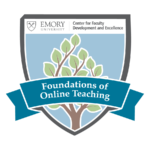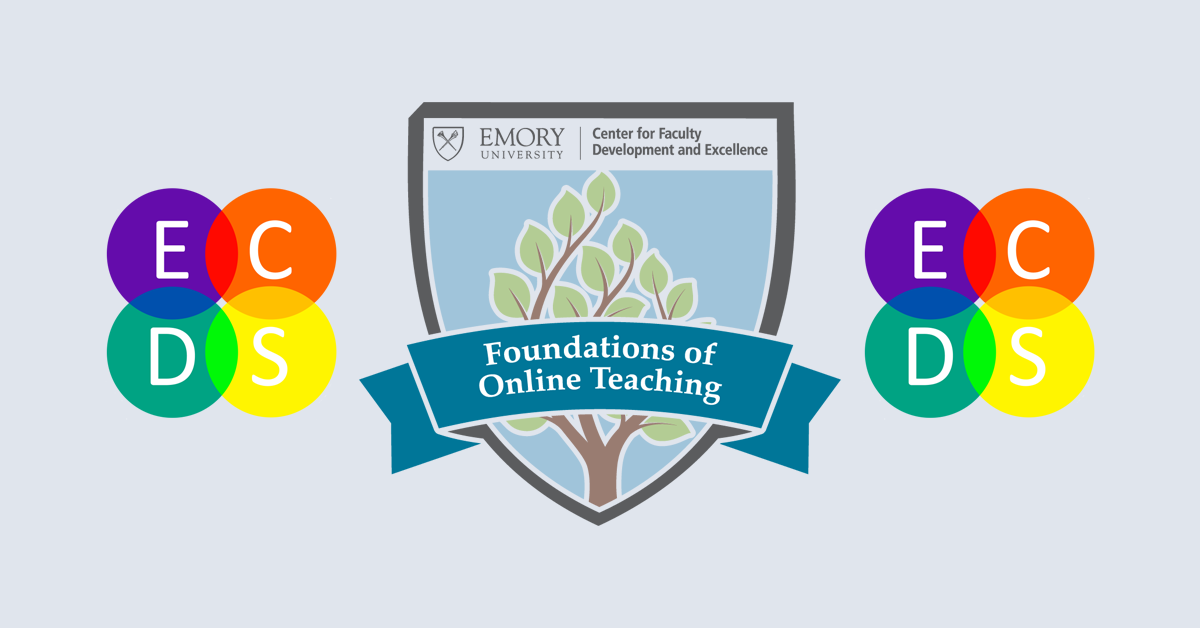Emory Foundations for Online Teaching (EFOT) is a professional development opportunity that introduces faculty and graduate students to best practices for online teaching. The program—first developed in 2014—is a partnership between the Center for Faculty Development and Excellence (CFDE), who manages the faculty sessions, and the Emory Center for Digital Scholarship (ECDS), who manages the graduate student sessions. This course is open to graduate students of all disciplines across Emory University and has experienced increased demand during this time of COVID-19 and remote teaching. The first summer session of 2020 has already begun, running from May 11-June 11; you can read the information provided in the initial call for applications in our blog post from March 2020.
is a professional development opportunity that introduces faculty and graduate students to best practices for online teaching. The program—first developed in 2014—is a partnership between the Center for Faculty Development and Excellence (CFDE), who manages the faculty sessions, and the Emory Center for Digital Scholarship (ECDS), who manages the graduate student sessions. This course is open to graduate students of all disciplines across Emory University and has experienced increased demand during this time of COVID-19 and remote teaching. The first summer session of 2020 has already begun, running from May 11-June 11; you can read the information provided in the initial call for applications in our blog post from March 2020.
This first session of EFOT experienced such high demand that ECDS plans to offer a second session in the summer. (More information forthcoming.) ECDS co-director Wayne Morse explains that the second session of EFOT is aimed at graduate students from across Emory who have not yet had the opportunity to take part in any of the other programs happening across campus in support of remote and hybrid learning.
We have asked Shari Wejsa and Bailey Betik, the EFOT graduate student instructors for the first 2020 summer session, to reflect on EFOT thus far, in anticipation of the second session of EFOT (EFOT 2).
Shari:
 There was an increased interest in EFOT this year. We had more than 40 graduate student applicants—enough to fill two sections—by the application deadline. As a result, we did not have to extend the deadline, unlike previous years, and instead had to create a wait list for those who had inquired about participating after the deadline for this session had passed. We have encouraged those who we couldn’t enroll in EFOT during this offering to apply for EFOT 2. (More information, including the dates/schedule of the program, are forthcoming.)
There was an increased interest in EFOT this year. We had more than 40 graduate student applicants—enough to fill two sections—by the application deadline. As a result, we did not have to extend the deadline, unlike previous years, and instead had to create a wait list for those who had inquired about participating after the deadline for this session had passed. We have encouraged those who we couldn’t enroll in EFOT during this offering to apply for EFOT 2. (More information, including the dates/schedule of the program, are forthcoming.)
We just completed our third week of EFOT, and it is apparent that the currently enrolled graduate students are highly engaged and very enthusiastic about the course and its application to their own teaching and course development. For example, we had a high turnout for our optional ‘Meet and Greet’ synchronous Zoom sessions in the first week. Several students shared their motivations for taking the course, which included being interested in learning about how to tackle the challenges of online teaching. Some expressed their concerns about how to create a sense of community in an online learning environment. Others mentioned that they hoped to learn more about how to encourage students with different personalities and cultural backgrounds to participate in synchronous sessions. Participants are only required to attend two synchronous Zoom sessions throughout the six weeks, which are offered twice per week and led by different instructors. However, several have expressed interest in attending both sessions offered each week, hoping to learn from the instructors’ different teaching styles and the diverse composition of colleagues who attend the sessions.
The asynchronous discussion thread has also provided some insight into the motivations underlying graduate students’ participation. Some are interested in learning more about how to encourage student participation in discussion threads. Others have initiated conversations about the role of the instructor in these discussions. Overall, it’s clear that graduate students participating in EFOT want to learn how to be better educators, especially when teaching online.
In addition to the EFOT goals that I mentioned for the first blog post, I want to highlight a few more. EFOT is designed to teach best practices for online teaching. However, we also integrate important pedagogical ideas and considerations that can be applied to teaching in any venue. We address the importance of creating sound learning objectives and how Backward Design and scaffolding can help instructors meet those objectives. We discuss the importance of keeping different learning modalities in mind when developing lessons and activities. We also highlight the importance of accessibility and Universal Design in the EFOT course content. Ultimately, by taking EFOT, students prepare to be even better educators.
Bailey:
 Echoing what Shari has said, I would like to highlight what a great forum EFOT is to collaborate and get ideas from other graduate students from all across the university. We have students enrolled from diverse fields including nursing, French, and psychology, and with different prior teaching experiences. Some have taught at Emory before, some have extensive experience with adult education in ministry or public health contexts, and some are preparing to be TAs for the first time. EFOT is also a wonderful six-week practicum in creating digital content. Whether it’s your first time in a classroom or your 500th, students leave EFOT with a toolkit of readily adaptable classroom materials like instructional videos, Canvas modules, and digital assignment ideas, as well as with a more developed understanding of key pedagogical concepts like backward design, lesson planning, and accessibility in the online environment.
Echoing what Shari has said, I would like to highlight what a great forum EFOT is to collaborate and get ideas from other graduate students from all across the university. We have students enrolled from diverse fields including nursing, French, and psychology, and with different prior teaching experiences. Some have taught at Emory before, some have extensive experience with adult education in ministry or public health contexts, and some are preparing to be TAs for the first time. EFOT is also a wonderful six-week practicum in creating digital content. Whether it’s your first time in a classroom or your 500th, students leave EFOT with a toolkit of readily adaptable classroom materials like instructional videos, Canvas modules, and digital assignment ideas, as well as with a more developed understanding of key pedagogical concepts like backward design, lesson planning, and accessibility in the online environment.
With the uncertainty of the status of the Fall 2020 semester, preparation for a possible online or blended course puts our graduate students ahead of the curve (so to speak) for what pedagogical challenges are sure to arise. It also appears that our current cohort of EFOTers are raising and critically thinking through questions about how to make the most human and “natural” experience for students given our COVID-19 situation: how do you build community online? How do you communicate joy and humor in the classroom in the midst of a global pandemic? How do you reaffirm students as people when you might never meet them in real life?
EFOT is a fantastic opportunity for professional development for anyone in graduate school at the current economic and cultural moment. Now more than ever it seems paramount to have a level of digital fluency that would allow students to continue flourishing as graduate instructors as well as post-Emory in both academic and alt-ac career prospects. EFOT is a great gateway into exploring how to deploy technology in such a way that enhances human experiences, whatever path graduate students decide to take after graduation.
